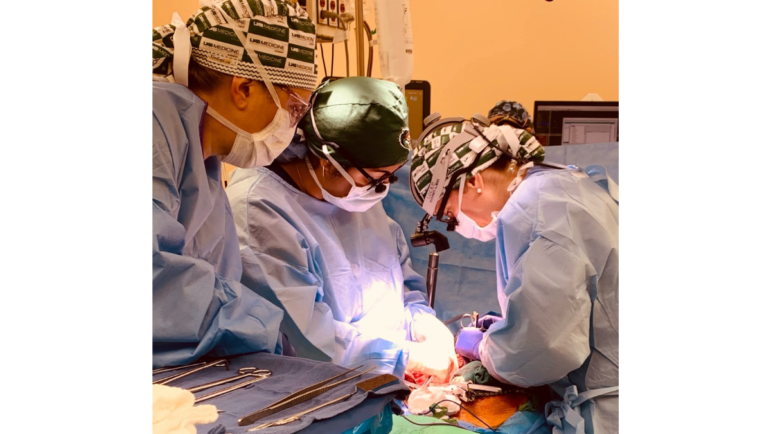A team of scientists at the University of Alabama at Birmingham is the first to successfully transplant the kidneys of a genetically modified pig into the body of a brain-dead recipient.
The surgery, which took place last September, is detailed in a peer-reviewed article published Thursday in the American Journal of Transplantation.
Upon being transplanted into the human recipient, researchers said the pig kidneys turned pink, and one began to make urine after 23 minutes.
“That is what every transplant is supposed to do, and it was amazing,” said Dr. Jayme Locke, director of UAB’s Comprehensive Transplant Institute and lead surgeon for the study.
The study lasted 77 hours before the recipient was taken off of life support. During that time, the kidneys appeared to function, though one produced more urine than the other, and there were no signs of immediate organ rejection. Additionally, no pig viruses or pig cells were detected in the recipient’s body.
The research is the latest milestone in the field of xenotransplantation and the first time that such a surgery has been described in a peer-reviewed journal.
Locke is hopeful that genetically modified pig organs will one day provide a life-saving solution for thousands of people who die every year waiting for a kidney transplant.
“They have a disease that we have a cure for, but we don’t have enough and we need a radical solution,” Locke said. “We have to find an alternative organ source, and xenotransplantation, I believe, is the answer.”
Locke said UAB’s research will likely be key to gaining approval from the U.S. Food and Drug Administration for a Phase 1 clinical trial, which researchers hope to begin later this year.
The study answered several questions about the viability of genetically modified pig kidneys inside the human body. It also demonstrated a new model of testing research on a brain-dead recipient.
Scientists hope to name the model they tested after the individual in the study, 57-year-old Jim Parsons, who was fatally injured in a motorcycle accident last year.
Parsons’ family, who consented to the research, described him as a compassionate father who sought adventure and was always willing to help.
“Our greatest hope is that this study … will ultimately bring new life to hundreds of thousands of people in the United States and around the world in need of a kidney transplant,” said Parsons’ ex-wife Julie O’Hara. “We’re forever honored that Jim’s gift has an opportunity to give those in need a chance at life.”
Many questions remain about the process of xenotransplantation, but scientists hope it could be an option for patients in the coming decade.
Last fall, surgeons at NYU Langone Health attached a genetically modified pig kidney to the outside of a brain-dead recipient’s leg. Earlier this month, surgeons in Maryland completed the first successful transplant of a pig heart into a living recipient.
EDITOR’S NOTE: UAB holds WBHM’s broadcast license, but our news and business departments operate independently.

